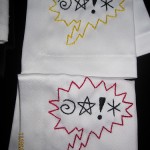Homophones are the words that sound the same but are spelled differently and have different meanings. Spell check doesn’t always catch homophones so you need proofread carefully. Check out the Grammarly.com blog-post (edited) below to see some common homophones.
While Grammarly has algorithms that will help you correct all of these common mix-ups, there’s no substitute for the old noggin. So next time you’re writing, be sure to put on your thinking cap and look out for these homophones that most spell checkers won’t catch.
A while/Awhile
It had been a while since the long-lost lovers had seen each other, but their passion was still so true they didn’t mind waiting awhile for their fast-approaching reunion.
Accept/Except
Everyone except Christopher, who has already discovered the truth, needs to accept the fact that the world is not flat.
Affect/Effect
The technicians didn’t realize that the special effect that creepily breathed down viewers necks would affect audience members so deeply. People ran out of the theater screaming.
Aide/Aid
The teacher’s aide was the first to arrive at school that day. So when the tornado hit, she gave as much aid to the kids as possible.
Aloud/Allowed
After breaking the television set he wasn’t allowed to touch, Bart had to repeat this phrase aloud 1,000 times: I will not replace the television dials with marshmallows.
Anytime/Any time
Call anytime! Actually, scratch that. Call me at any time after 5:00 p.m.
Bizarre/Bazaar
The strange, old-fashioned bazaar featured a freak show made up of bizarre and mysterious people.
Capital/Capitol
The protesters left their own state capitals to converge on the Capitol building in Washington, DC, and rally for their cause.
Cite/Site/Sight
The site of the excavation came into sight as they emerged from the tunnel. If the bones were in fact dinosaur bones, then scientists would need to cite the analysis taken from this discovery in every paleontology research paper for the next hundred years.
Compliment/Complement
The winemaker received compliment after compliment for her incredible pairing. Each selected dish seemed the perfect complement to the chosen vintages.
Conscience/Conscious
My conscience plagues me most when I’m sleeping. Then, when I wake up, I become conscious of the guilt I’m feeling for my actions.
Desert/Dessert
If only this hot, sandy desert was made of dessert. Then I could simply eat my way out of it.
Elude/Allude
If you’re going to allude to your diamond heist so casually in conversation, you should prepare to elude the authorities, who will most likely find out about the theft.
Ensure/Insure
It seems strange that in order to ensure my son can receive medical treatment, I need to insure him with the healthcare company on the day of his birth.
Every day/Everyday
Just because the office attire is everyday wear doesn’t mean you should wear the same clothes every day.
Formerly/Formally
Formerly a Buddhist monk clothed only in a tunic, he was confused by the need to dress formally, in a shirt and tie, for work.
Guerilla/Gorilla
The paramilitary forces had a new tactic; they were going to use actual gorillas as foot soldiers in their guerilla warfare.
Led/Lead,
He led them through the dangerous forest of giant spiders with only a headlamp and a lead pipe. As the lead scout, he needed to be brave and fearless even though he felt incredibly frightened.
One/Won
She won the costumed thumb war competition by one measly point.
Pedal/Peddle
If you want to peddle stolen goods to innocent people, you’d better be prepared to pedal your bike as fast as you can away from the town when you’re done.
Pore/Pour
If you pore over your schoolbooks with the same discipline that you apply to gaming, I won’t be forced to pour this macaroni over your head.
Premier/Premiere
The premier of Switzerland eagerly awaited the premiere of the new production of the Sound of Music. The woman cast as Maria was the country’s premier actress.
Principle/Principal
School principals should be people of principle. Their behavior and attitude should, in principle, be an example to all students.
Reign/Rein
Take the reins and lead the horse as if you’re ruling a kingdom and your reign has lasted five decades.
Weather/Whether
Who cares about the weather? We’re going to have a good time regardless of whether it’s raining, snowing, or glowing.




